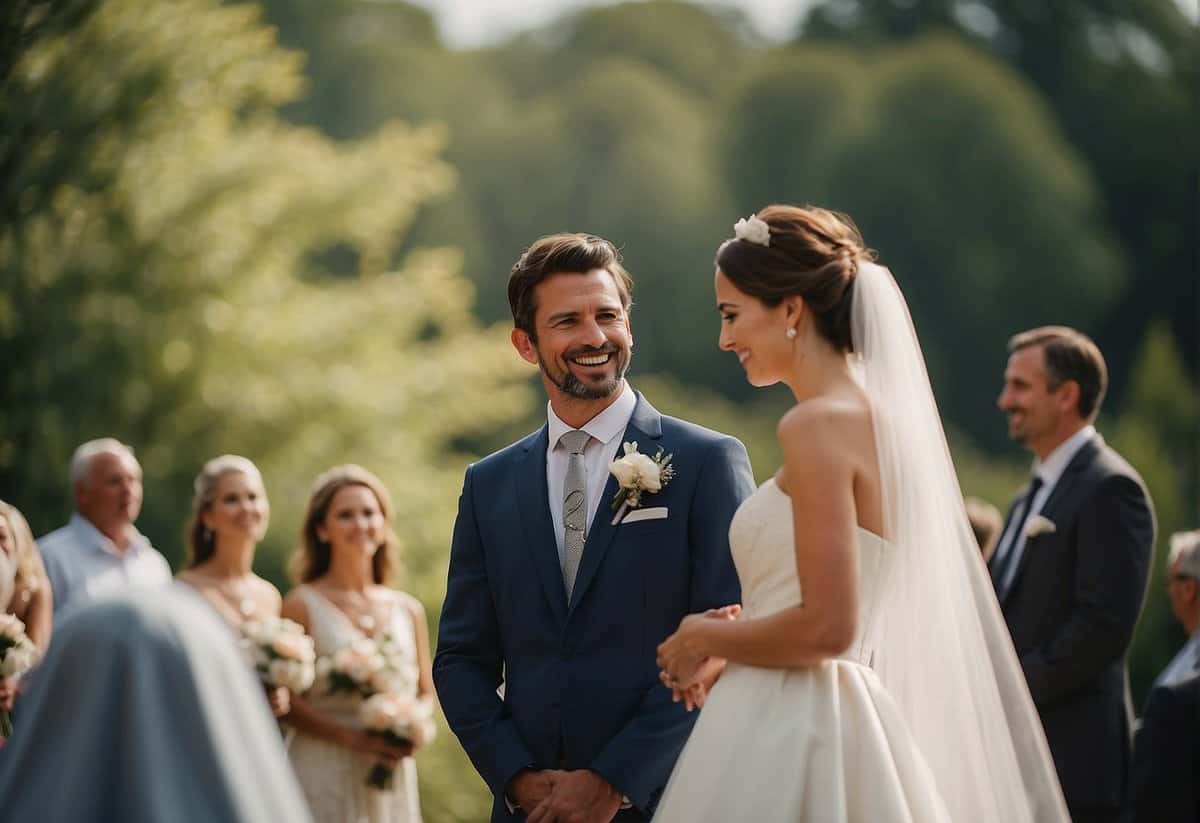Can You Get Married Just You and Your Partner? Exploring Intimate Ceremonies
Deciding to get married is a profound and personal decision that traditionally involves a ceremony with friends and family. However, you may wonder if it’s possible to get married with just you and your partner present. The concept of an intimate ceremony without guests centers on the couple and the commitment they are making to each other, often reflecting a desire for a private and personal exchange of vows.

Legal requirements for marriage vary by location, but generally, a couple seeking to marry without guests can do so provided they meet the jurisdiction’s marriage laws including age, consent, and the presence of an officiant and witnesses if required. Once the legal aspects are handled, planning your intimate ceremony can start. Whether it’s a simple exchange of vows or something a touch more elaborate, the day is yours to shape. After the ceremony, ensuring your marriage is recognized legally by obtaining a marriage certificate is essential, as it affects numerous aspects of your life including financial, legal, and personal relationships.
Key Takeaways
- An intimate ceremony can focus on you and your partner with careful consideration of legal requirements.
- Planning an intimate wedding involves meeting jurisdictional laws and creating a ceremony that reflects your relationship.
- After the wedding, obtaining a marriage certificate is crucial for the legal recognition of your union.
Understanding the Legal Requirements

Before you can embark on a journey to marry just with your partner, it’s vital to understand that adhering to the legal framework set forth by your state is non-negotiable. Ensuring you have the right documentation and fulfill each requirement will pave the way for a legally recognized union.
Acquiring a Marriage License
To make your marriage official, the first step is obtaining a marriage license. This is a must, and without it, your marriage won’t be legally recognized. In states like California, you must apply for a license at a county clerk’s office, and you’ll typically need a valid form of identification like a driver’s license or a passport. Remember that a Social Security number is often required if you have one.
State Laws and Permissions
Each state, from Alaska to Arkansas, has specific state laws governing marriage. This could mean varying waiting periods from the time you receive your license to when you can actually marry, or different rules about who can officiate your marriage. Some states also require a blood test or have unique stipulations about parental consent for those under the age requirement.
Age and Identification Criteria
The legal age requirement to marry without restriction is typically 18; however, individuals younger than this may marry with parental consent and/or a court order in specific states, such as California. Identification to prove your age, like a birth certificate or passport, is crucial to proceeding. It’s important to note that bigamy is illegal, so neither party can be legally married to someone else at the time of their wedding. Ignoring these regulations can lead to fines or invalidate your legal marriage.
Remember that while marrying just you and your partner is a personal and intimate decision, meeting the legal requirements is essential for ensuring that your marriage is recognized and lawful.
Planning Your Intimate Ceremony

When you’re planning to get married focusing solely on the love between you and your partner, an intimate ceremony can embody the core values of your relationship. Let’s walk through the essential steps to make your day special and legally sound.
Selecting an Officiant
Choosing the right officiant is key to a meaningful intimate ceremony. Depending on your location and your personal beliefs, this could be a religious leader, a secular official, or even a friend or family member who becomes ordained for your special day. It’s important to have a conversation with your officiant about your vision for the ceremony to ensure they can help reflect your relationship’s unique connection.
Determining Witness Requirements
Even though your wedding may just involve you and your partner, most jurisdictions require at least two witnesses to sign the marriage certificate. These can be close friends, family members, or even strangers you’ve asked to be part of your day. Check your local laws to see how many witnesses you’ll need and what qualifications they must meet.
Venue Considerations
Your ceremony venue sets the tone for your wedding. Whether you choose a meaningful spot that holds significance to you both, a picturesque outdoor setting, or a simple courthouse wedding, make sure it aligns with what feels authentic to your relationship. If you’re opting for a scenic location or considering travel, you might find helpful information on planning a wedding in a destination like Mykonos, which is suited for small gatherings. Remember, the place where you exchange vows should resonate with your joint narrative and celebrate your union intimately.
Ensuring Your Marriage Is Recognized

To guarantee that your marriage is legally acknowledged, you need to understand the necessary paperwork and the legal stipulations that confirm the validity of your union.
Marriage Certificate and Copies
Your marriage certificate is a crucial document affirming that you are legally married. Ensure you obtain a certified copy—which is a legally recognized duplicate of the original—right after your wedding. Store it safely as you’ll need it for various formal purposes, such as changing your name or applying for certain benefits. It’s wise to procure several certified copies; this way, you are prepared for any situation that requires proof of your marriage.
- Acquiring a Marriage Certificate:
- Register your marriage with the local authorities.
- Request certified copies from the issuing office; there may be a fee.
Legal Considerations Beyond the Ceremony
A legally binding marriage involves more than saying vows. First, your relationship must meet criteria that fall outside of a common law marriage—for instance, neither of you can be married to someone else, a situation that would render the new marriage void or potentially lead to an annulment if contested. Additionally, legal marriage can affect inheritance rights and prove a committed relationship in legal matters.
- Verifying a Legal Marriage:
- Check your local laws for age, consanguinity, and other marriage requirements.
- Consider if requirements for a destination wedding differ from your home country.
- Confirm that your marriage is registered and recognized by your government for situations like taxation and social security benefits.
Remember, the foundational step is ensuring that your marriage is lawful from the start, followed by securing the necessary documentation that recognizes your union both domestically and abroad.
After the Wedding: Legal and Relational Implications

After you’ve said your “I dos,” be prepared for the changes that marriage brings, both legally and within your personal relationships.
Financial and Legal Responsibilities
Once married, your financial and legal responsibilities evolve. Joint tax filing may offer benefits, and it’s crucial to update your wills to reflect your new status. Consider how joint ownership of assets works, as any properties and debts may become shared assets or liabilities.
- Money: Maintain open communication about finances to avoid friction.
- Responsibilities: Establish who handles day-to-day financial tasks and bigger decisions.
Understanding the legal rights of spouses helps navigate shared fiscal duties.
Navigating Changes in Family Dynamics
Marriage often means joining two families into one.
- Children: Decide if and when to have them, considering how they’ll fit into your combined families.
- Family: Discuss expectations on holidays, traditions, and involvement to mitigate potential conflicts.
The addition of in-laws can be a beautiful expansion of your family circle but may also require setting non-negotiables to protect your relationship.
Handling Relationship and Communication Challenges
Cohabitation or civil marriage intensifies the need for solid communication skills to handle relationship issues.
- Communication: Be clear and kind when discussing non-negotiables to prevent misunderstandings.
- Divorce: Though it’s not pleasant to think about, understand that it’s a possibility and part of marriage’s legal aspects.
Fairly distribute responsibilities, and don’t shy away from seeking counseling to address unresolved issues. Early intervention can prevent conflicts from escalating.
Frequently Asked Questions

In an intimate ceremony, you have the flexibility to get married just the two of you. This section addresses common inquiries regarding smaller weddings without guests.
How can a couple get married without any guests present?
You can opt for a courthouse wedding, which typically does not require guests. Just select a date and courthouse venue, and the marriage can often happen within weeks, or sometimes the same day your marriage license is approved.
What is required for a self-solemnizing marriage ceremony?
A self-solemnizing marriage allows you to marry without an officiant or witnesses. Requirements vary by location, but you generally need to apply for a specific marriage license that acknowledges self-solemnization, available in states like Colorado, Pennsylvania, and Wisconsin.
Are there any states where no witnesses are needed for a marriage to be legal?
Yes, certain states such as California and Nevada do not require witnesses for a marriage ceremony. However, other states may require at least one or two witnesses, so you should check local marriage laws.
What are the key differences between an elopement and a traditional wedding?
An elopement is usually a quick, private ceremony often with just the couple, while a traditional wedding includes guests, a planned reception, and other festivities. Elopements focus on the couple’s bond without the extensive planning a traditional wedding requires.
How can one have a legally recognized marriage without an officiant?
In states permitting self-solemnization, couples can marry legally without an officiant. Just ensure that your marriage license is correctly filled out and filed according to your state’s guidelines.
In what scenarios can you have a marriage that is symbolic but not legally binding?
Couples who want a ceremony without the legal formalities can have a commitment ceremony. Although this is not legally binding, it allows you to express your dedication to each other in a personal and meaningful way, without the necessity of a marriage license.

